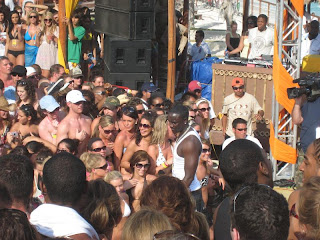
Remember that Mexico is a big country. There are parts of the US where you do not want to go, places where you would prefer to not wander around at 11 PM alone, and places where you feel absolutely safe. The same applies to Mexico. The majority of the country is pretty safe, but you should take some precautions whenever you travel.
At the moment there are a number of warning to avoid certain parts of Mexico because of ongoing drug wars. Despite this, you can have a lot of fun! This post is really just spelling out common sense.

First of all, most tourist resorts are really safe places: Cancun, the whole Riviera Maya, Puerto Vallarta, Acapulco, Zihuatanejo, Chichen Itza...the places travel agencies and many online sites like Expedia and Orbitz. A lot of these places have tours to nearby attractions. Many colonial cities are pretty safe. Anywhere you travel, use regular precautions: I was pickpocketed for the only time in my life in Boston! There are companies that specialize in adventure travel, and they also tend to be fine (if they make you sign a "Hold Harmless" clause, read carefully!).
At these places, your chances of being a crime victim are much smaller than your changes of contracted an STD (or getting pregnant), or getting sick from drinking too much. Also, avoid drugs...you don't want to be around the wrong kind of people.
It's also important to know what places you should avoid because of either turf wars among drug cartels or fights between dealers and authorities (the Mexican president has been really clamping down on the drug trade and they have been fighting back). The number one place is Cuidad Juarez, across the border from El Paso, TX. There have been multiple murders in this city, including an employee of the US consulate along with her husband. In general, staying away from the border is a good idea. The Pacific states of Michoacan and Sonora - both in green on the map - have also had problems with fighting among the drug cartels.
So if you can, go have fun and learn what you can! But be safe.
If you had the chance to go anywhere in Mexico (mentioned in this post or not) for spring break, where would you go? And why did you choose this place?
